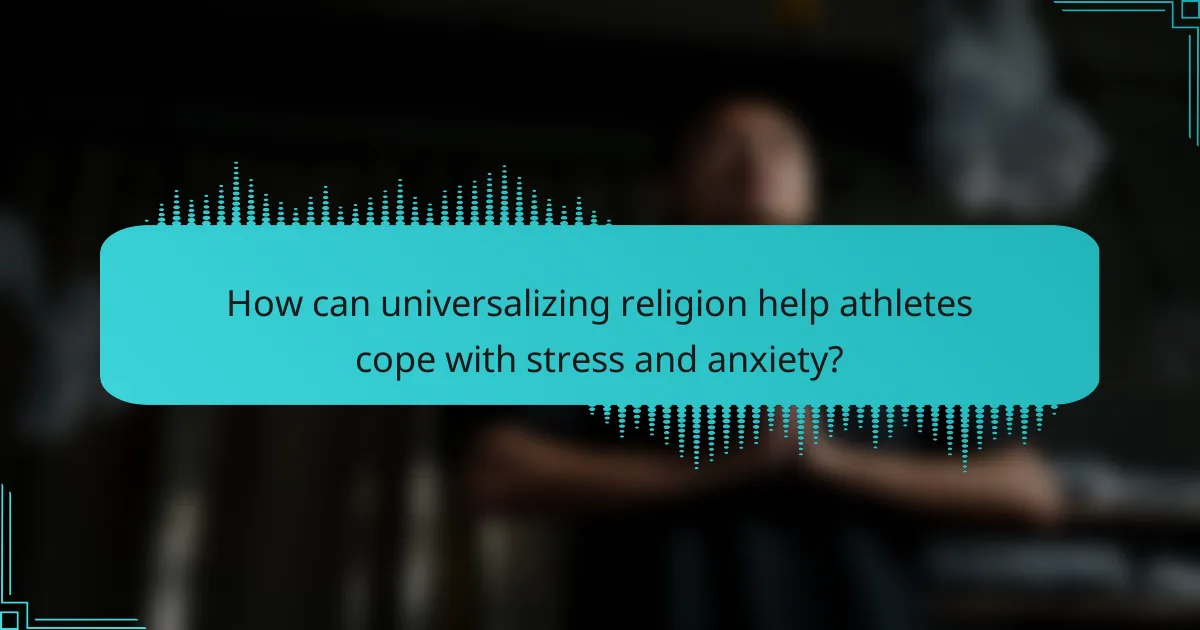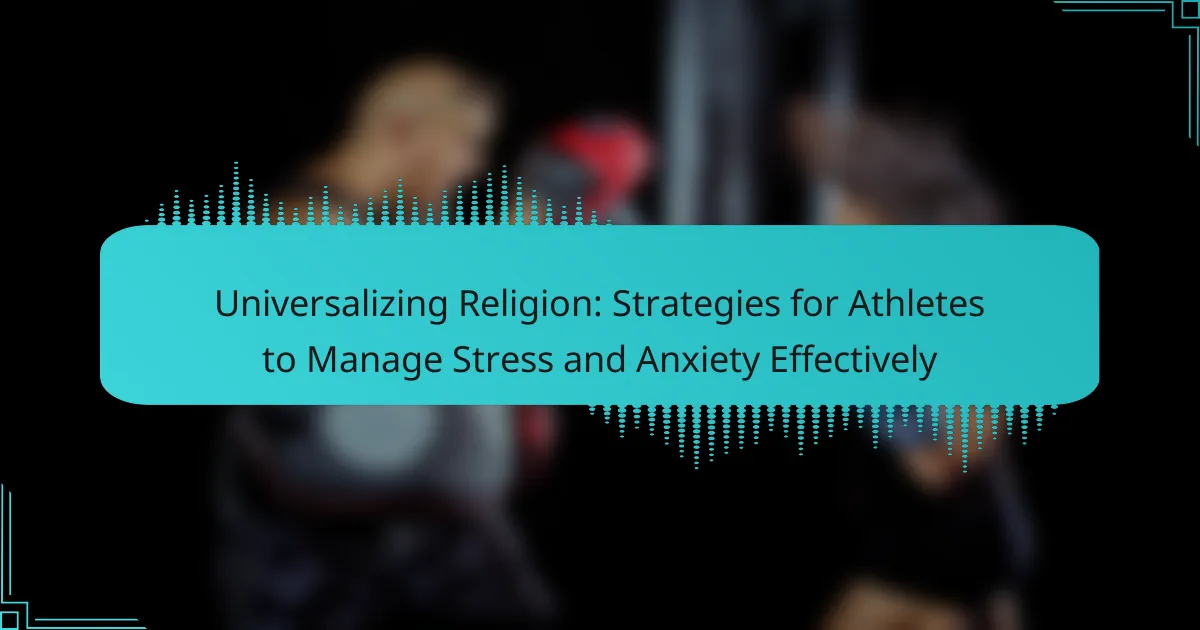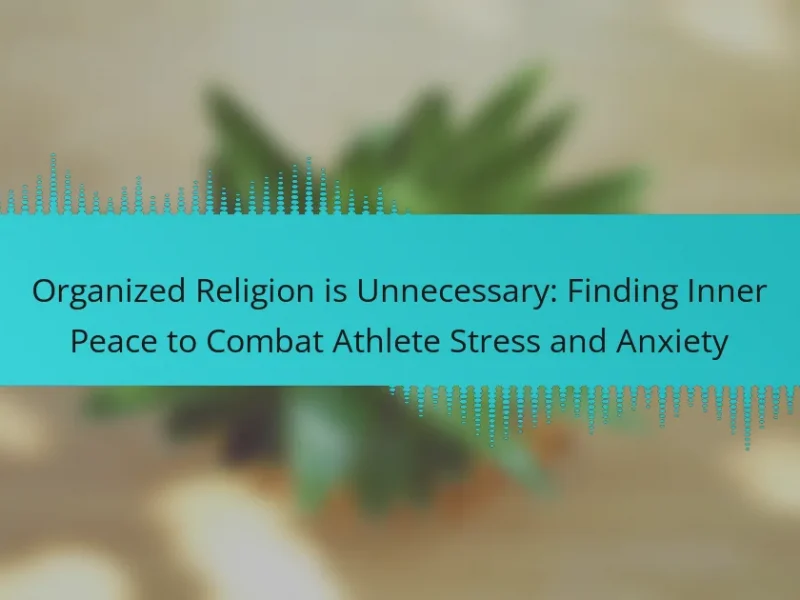Athletes often face significant stress and anxiety that can hinder performance. Universalizing religion offers valuable strategies for managing these challenges through community support, mindfulness practices, and a strong sense of purpose. Techniques such as meditation and deep breathing enhance focus and resilience. Creating a supportive environment fosters openness and mental conditioning, contributing to improved well-being and performance.

How can universalizing religion help athletes cope with stress and anxiety?
Universalizing religion can provide athletes with effective strategies to manage stress and anxiety through community support, mindfulness practices, and a sense of purpose. Engaging in religious communities fosters social connections, which can alleviate feelings of isolation. Mindfulness practices, often incorporated in religious traditions, help athletes focus on the present moment, reducing anxiety. Additionally, a strong sense of purpose derived from belief systems can motivate athletes to overcome challenges. These attributes collectively enhance mental resilience, making universalizing religion a valuable resource for athletes facing stress.
What are the core principles of universalizing religion?
Universalizing religions aim to appeal to a broad audience, promoting inclusivity and shared values. Core principles include the belief in universal truths, the importance of missionary work, and the emphasis on personal salvation. These religions often adapt practices to different cultures, ensuring accessibility and relevance. They encourage community building and collective identity among followers, fostering a sense of belonging.
How do these principles apply to athletic performance?
Athletic performance can greatly benefit from strategies derived from universalizing religion to manage stress and anxiety. These strategies include mindfulness practices, community support, and a focus on purpose. Mindfulness enhances concentration and emotional regulation, which are crucial for peak performance. Community support fosters a sense of belonging, reducing isolation and increasing motivation. A defined purpose helps athletes stay committed and resilient during challenges. Integrating these principles can lead to improved mental well-being and performance outcomes.
What universal strategies do athletes use to manage stress and anxiety?
Athletes utilize various universal strategies to manage stress and anxiety effectively. These include mindfulness techniques, structured routines, and support systems.
Mindfulness techniques, such as meditation and breathing exercises, help athletes stay present and reduce anxiety. Structured routines provide a sense of control and predictability, enabling athletes to focus on performance. Support systems, including coaches, teammates, and mental health professionals, offer emotional backing and practical advice.
Incorporating these strategies can lead to improved mental resilience, allowing athletes to perform at their best under pressure.
Which techniques are most effective for athletes?
Mindfulness techniques, cognitive behavioral strategies, and breathing exercises are most effective for athletes to manage stress and anxiety. Mindfulness enhances focus and reduces distractions, while cognitive behavioral strategies help reframe negative thoughts. Breathing exercises promote relaxation and physiological calmness. Integrating these techniques into training routines can significantly improve performance and mental resilience.
What unique attributes of universalizing religion enhance stress management?
Universalizing religions provide unique attributes that enhance stress management for athletes. These attributes include community support, ritual practices, and spiritual beliefs that foster resilience. Community support creates a network of encouragement, helping athletes cope with stress through shared experiences. Ritual practices, such as meditation and prayer, promote mindfulness and relaxation, reducing anxiety levels. Spiritual beliefs instill a sense of purpose and meaning, enabling athletes to navigate challenges more effectively. Together, these elements create a holistic approach to managing stress and anxiety in competitive environments.
How can community support play a role?
Community support significantly alleviates stress and anxiety for athletes by providing a network of encouragement. Engaging with supportive peers fosters resilience, enhancing mental well-being. This social connection serves as a unique attribute, offering emotional stability and practical advice. As a result, athletes can better navigate challenges, leading to improved performance and overall health.
What rituals or practices can athletes adopt?
Athletes can adopt various rituals and practices to manage stress and anxiety effectively. Mindfulness meditation helps enhance focus and emotional regulation. Visualization techniques allow athletes to mentally rehearse performance scenarios, reducing anxiety. Deep breathing exercises promote relaxation and calmness. Establishing a pre-competition routine can create a sense of control and predictability, further alleviating stress. Engaging in physical activities like yoga fosters mental clarity and reduces tension. Finally, maintaining a gratitude journal encourages a positive mindset and emotional resilience.
What are some rare but notable practices within universalizing religion for stress relief?
Universalizing religions offer unique practices for stress relief that athletes can adopt. Notable rare practices include mindfulness meditation rooted in Buddhism, which enhances focus and reduces anxiety. Another rare practice is the use of prayer beads in various faiths, promoting rhythmic meditation and calming effects. Additionally, rituals like the Sufi whirling can serve as a physical manifestation of spiritual release, aiding in stress management. These practices, while less common, provide effective strategies for athletes to navigate stress and anxiety.
How do personal narratives influence coping mechanisms?
Personal narratives significantly enhance coping mechanisms by providing athletes with relatable frameworks. These narratives allow athletes to contextualize their stress and anxiety, transforming challenges into manageable experiences.
By sharing personal stories, athletes foster a sense of community and support, which is crucial for emotional resilience. This collective understanding helps individuals realize they are not alone in their struggles, promoting healthier coping strategies.
Furthermore, integrating universalizing religious principles into these narratives can offer athletes a unique perspective on stress management. Such strategies often emphasize mindfulness, purpose, and community, all of which contribute to improved mental well-being.
Ultimately, personal narratives serve as powerful tools for athletes, enabling them to navigate stress and anxiety effectively through shared experiences and supportive frameworks.
What role does spirituality play in an athlete’s mental health?
Spirituality significantly enhances an athlete’s mental health by providing coping mechanisms for stress and anxiety. Engaging in spiritual practices fosters resilience, improves focus, and promotes emotional well-being. Studies indicate that athletes who incorporate spirituality report lower levels of anxiety and higher overall satisfaction in their performance. Spirituality offers a unique attribute of fostering a sense of purpose, which is crucial in high-pressure environments. Additionally, mindfulness practices rooted in spirituality can lead to improved concentration and reduced performance-related stress.

How can athletes implement these strategies in their training?
Athletes can implement stress and anxiety management strategies through consistent practice of mindfulness techniques. Incorporating meditation, deep breathing exercises, and visualization can enhance focus and emotional resilience. Additionally, establishing a supportive environment with team discussions and mental health resources fosters a culture of openness. Regularly scheduled training sessions that include mental conditioning can further solidify these strategies, leading to improved performance and overall well-being.
What are the best practices for integrating spirituality into daily routines?
Integrating spirituality into daily routines can effectively reduce stress and anxiety for athletes. Practicing mindfulness through meditation or prayer, engaging in reflective journaling, and incorporating gratitude exercises can enhance mental resilience. Establishing a consistent schedule for these activities fosters a sense of routine and stability. Connecting with nature and participating in community service can also deepen spiritual engagement, promoting overall well-being.
What common mistakes should athletes avoid when using religious strategies?
Athletes should avoid over-reliance on religious strategies, neglecting practical techniques. Common mistakes include disregarding physical training, isolating from teammates, and misinterpreting religious texts. Balancing faith with evidence-based practices enhances stress management. Effective integration of spirituality and athletic discipline fosters resilience.
What expert insights can enhance understanding of stress management in sports?
Expert insights emphasize the importance of mental resilience in stress management for athletes. Techniques such as mindfulness and cognitive restructuring can significantly reduce anxiety. Research shows that athletes using these strategies report enhanced performance and lower stress levels. Additionally, integrating relaxation techniques into training routines fosters a positive mindset, contributing to overall well-being.
How can athletes seek guidance from mentors or coaches?
Athletes can seek guidance from mentors or coaches by establishing open communication and setting clear goals. A mentor or coach provides tailored strategies to manage stress and anxiety effectively. Regular check-ins help track progress and adjust techniques as necessary. Additionally, athletes can benefit from shared experiences and insights that mentors offer, enhancing their coping mechanisms.
What resources are available for athletes exploring these strategies?
Athletes exploring strategies to manage stress and anxiety can access various resources. These include mental health professionals specializing in sports psychology, online platforms offering mindfulness and meditation practices, and workshops focusing on stress management techniques. Additionally, books and articles on coping strategies provide valuable insights. Peer support groups and community forums can also be beneficial for sharing experiences and tips.


